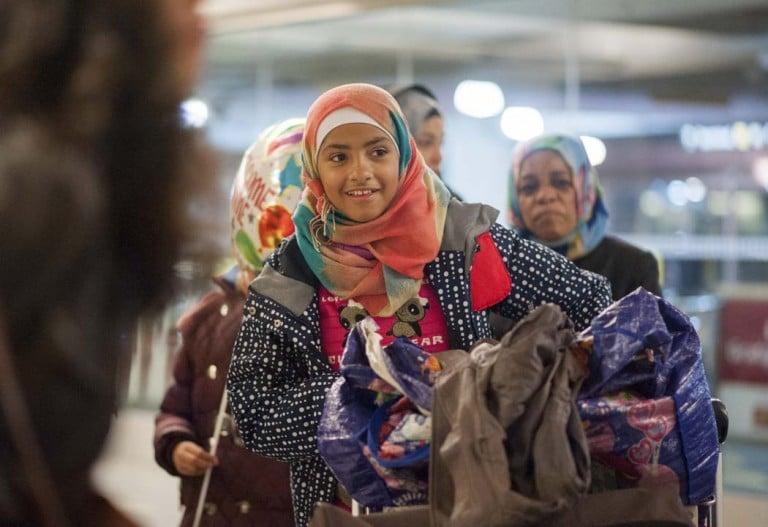Play groups for Syrian kids provide a break from the wait for new homes
OTTAWA – In his house in Damascus, 10-year-old Abdelkader had a big bedroom filled with sunshine that he shared with his whole family.

Hanien Falah, a refugee from Syria, walks with her family to the parking lot at the Toronto Pearson International Airport on Thursday, Dec. 10, 2015 after arriving from Frankfurt, Germany. (Photograph by Hannah Yoon)
Share
OTTAWA – In his house in Damascus, 10-year-old Abdelkader had a big bedroom filled with sunshine that he shared with his whole family.
So it’s not so difficult, he says, to share a room with them now in a downtown Ottawa hotel, as they await permanent homes in the national capital like hundreds of other Syrian refugees who have arrived in the last three months.
While his parents go to orientation sessions on everything from opening a bank account to signing up for English classes, Abdelkader and about 50 other children pack a boardroom nearly every day on the 11th floor of the Radisson for an hour of nothing but play.
The play groups were set up in response to a need identified when a surge in Syrian refugee arrivals overwhelmed settlement agencies in Ottawa.
Larger family sizes than anticipated made permanent homes harder to find, leaving families in hotels longer than expected. There were also far more children — about 55 per cent of government assisted Syrian refugees are under the age of 14.
Since the children can’t start school until they’re in their permanent homes, a group of community health care centres in Ottawa are running play groups at the hotels along with the English classes and medical support they provide on site.
The kids, ranging in age from a few months old to even older than Abdelkader, crowd around the door before the workers get the keys, eager to be let into the tiny room to have at the bounty of toys and crafts.
Inside, the heat is stifling, the sound overwhelming. Plinking piano keys, loud games of tug of war over favourite dolls or plastic cars and the general mayhem that comes when so many children are jammed into the same space.
The walls of the boardroom are covered in paintings and drawings. There’s a Canadian flag, a paper filled with glittery ABC stickers, images of butterflies and cats and dogs.
But if there’s a common theme, it’s paintings of homes.
Abdelkader did one, a purpley-pink house with a yellow sun overhead, his name scrawled in Arabic at the top. There are two figures in the picture, one of whom is a play group staff member who serves as Arabic translator. Abdelkader is the other.
It was a gift, he says, to say thank you for her help. But it’s also how he imagines what his home will one day look like — when his family eventually gets one — in Ottawa.
“I’d love to have a home like this picture,” Abdelkader says through a translator.
Kimberly Vandermeer, who runs the daily play group at the Radisson, also runs play groups at family shelters. Kids are the same no matter where they are from, she said — they all want to draw pictures of home.
“It’s something universal — where your family comes together, it’s where you learn, it’s where you grow without even knowing you’re growing,” she said.
Vandermeer said each day she watches the children grow a little more confident as they navigate their new lives. Part of each play group is circle time, where the children sit and sing songs like “Itsy Bitsy Spider” and “Row, Row, Row Your Boat.” Each day more of them seem to pick up more of the English words, she says.
But challenges remain. The hotels are just a waypoint and the adjustment to their new apartments, new schools and new neighbourhoods, when they eventually find them, will take time.
Sabah Alharaki, 33, has six children. The oldest is 16, the youngest 10. Unlike the vast majority of refugees coming to Canada under the Liberal program, she came to Ottawa from the sprawling Zaatari refugee camp in Jordan.
While that was better than Syria, it is still better here, Alharaki said. Sometime in the next week her family will be moving into an apartment and begin the settlement process in earnest.
Through a translator, she expresses gratitude for the kindness everyone has shown her since she arrived. What she’s most looking forward to, she added, are the future opportunities for her children.
“Thank God,” Alharaki said, “they will have a chance.”